Development as learning to solve the motor problem
This video of Will in prone beautifully illustrates the amount of exploration, persistence and repetition is part of the process of learning how to adapt weight distribution and alignment of body segments (postural adjustments) to support goal directed actions.
The clip reinforces the idea that postural adjustments are learned and are specific to the task (in this case reaching for toys in different locations) and context (supine on a firm support surface).
Will's musculoskeletal structure and function allow him to explore a variety of postural adjustments. He a sturdy little fellow, with good muscle strength, typical amounts of stiffness in his connective tissue structures and good flexibility in his trunk and limbs.
His previous experience in prone means that he has the muscle strength to lift his head and shoulder up off the support surface.
|
Postural control and stability (weight distribution, alignment, anticipation and adaptation to perturbations) is learned through a process of exploration, trial and error and persistent practice. |
Will prone at 5 months
At five months Will nas learned to roll from supine to prone and is at last willing to spend time in prone, and is very busy exploring how to maintain his balance as he starts to reach for toys.
- He is starting to take weight on his forearms as well as on the hands with the elbows extended.
- He holds his head up with the face vertical.
- His fingers are either extended or lightly fisted, with the thumb in various degrees of abduction and extension.
As before, pushing up onto his forearms and hands is supported by extension of the trunk which now includes extension of the thoracic and the lumbar spine.
- Mostly his hips are in some flexion, abduction with some knee flexion. From time to time you see him extending the hips and knees.

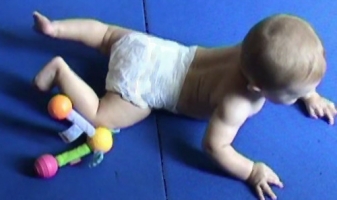
As is typical at this age, Will takes weight on the hands and forearms with the elbows in varying degrees of extension and the shoulders in varying degrees of flexion.
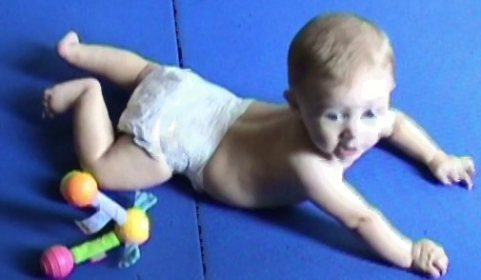
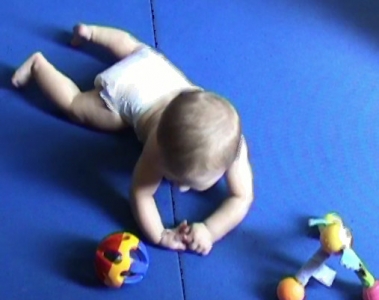
At 5 months Will is able to lift the head, shoulders and thighs up off the SS (prone pivot) very briefly. This action requires good trunk and hip extensor muscle strength.

He is also starting to push up on both hands and extend the elbows for brief periods.
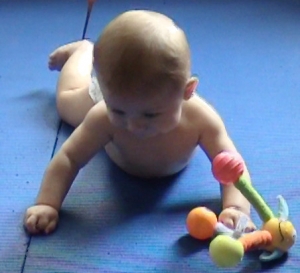
Exploring balance and weight shift
With the torso lifted up off the support surface and some weight being taken on the upper extremities, Will's COM has shifted towards the pelvis.
In order to maintain stability and balance as he explores looking around and reaching for toys, Will has to learn how best to realign the head, limbs and trunk to support his actions.
You will see will exploring different options for shifting his weight over the pelvis and UE's to maintain his balance. As he does this his COM shifts laterally and in a cephalo-caudal direction.
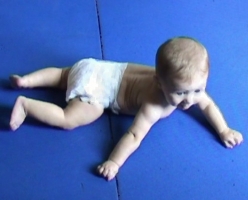
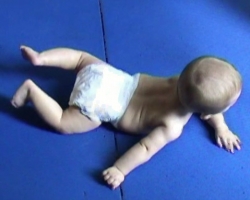

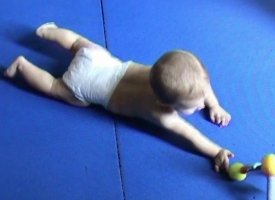
Exploring weight shift for reaching
In the series of frames below you see Will exploring different options for weight bearing over the pelvis as he shifts his weight onto the left UE so as to free the right UE for reaching for a toy.
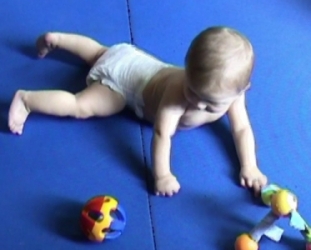




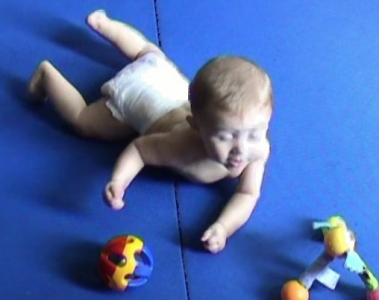

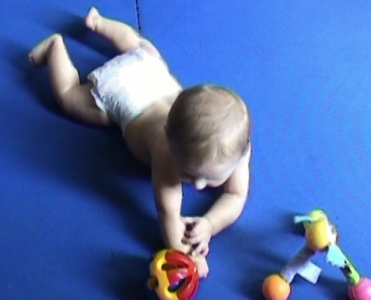
To change the play back speed, Click on the gear icon in the right hand bottom corner of the video frame and select the speed.
Return to